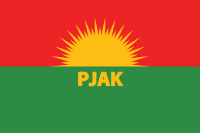PJAK
|
Kurdistan Free Life Party
Partiya Jiyana Azad a Kurdistanê (PJAK) پارتی ژیانی ئازادی کوردستان |
|
|---|---|
 |
|
| Leader | Abdul Rahman Haji Ahmadi and Evindar Renas |
| Founded | 2004 |
| Armed wing | Eastern Kurdistan Units (YRK) |
| Women's wing | Women's Defence Forces (HPJ) |
| Ideology |
Kurdish nationalism Democratic Confederalism Democratic socialism Libertarian socialism |
| Political position | Left-wing |
| International affiliation | Kurdistan Communities Union (KCK) |
| Eastern Kurdistan Units Yekîneyên Rojhilatê Kurdistan (YRK) |
|
|---|---|
| Leader(s) | Abdul Rahman Haji Ahmadi |
| Dates of operation | 2004–2011 |
| Motives | To establish semiautonomous regional entities or Kurdish federal states in Iran, Turkey and Syria similar to the Kurdistan Regional Government, and establish a democratic confederalism as theorised by Abdullah Öcalan. |
| Active region(s) | Iraq, Turkey and Iran |
| Ideology |
Secularism, Kurdish nationalism Feminism, Democratic confederalism |
| Status | Active |
The Kurdistan Free Life Party or PJAK (Kurdish: Partiya Jiyana Azad a Kurdistanê) is a Kurdish political and militant organisation which has waged an intermittent armed struggle since 2004 against the Iranian government to seek self-determination for Kurds in Iranian Kurdistan.
Some experts describe PJAK as an offshoot of the Kurdistan Workers Party (PKK). Both groups are members of the Kurdistan Communities Union or KCK (Kurdish: Koma Civakên Kurdistan), an umbrella group of Kurdish political and insurgent groups in Turkey, Iran, Syria, and Iraq.
The membership of PJAK's armed wing, the Eastern Kurdistan Units or YRK, is estimated to be 3,000 and come from Iran, Turkey, Iraq, Syria, and the Kurdish diaspora. The group is considered a terrorist organisation by Iran,Turkey, and the United States, but not by the EU, UN or Russia.
The exact history of PJAK is widely disputed. Turkey and Iran claim that PJAK is an offshoot of the Kurdistan Workers' Party (PKK). According to some sources, members of the PKK founded the PJAK in 2004 as an Iranian equivalent to their leftist-nationalist insurgency against the Turkish government.
According to founding members of PJAK, however, the group began in Iran around 1997 as an entirely peaceful student-based human rights movement. The group was inspired by the success of Iraq's Kurdish autonomous region and by the PKK's struggle in Turkey. Discouraged by the failure of previous Kurdish revolts, however, PJAK's leaders initially worked only to maintain and build a Kurdish national identity and to thwart the Iranian government's attempts to re-brand Iranian Kurds as ethnic Persians or Aryans. After a series of government crackdowns against Kurdish activists and intellectuals, the group's leadership moved to the safety of Iraqi Kurdistan in 1999. There they settled in the area controlled by the PKK on the slopes of Mount Qandil, less than 10 miles from the Iraq-Iran border. Once established at Qandil and operating under the PKK's security umbrella, PJAK adopted many of the political ideas and military strategies of the PKK's leader Abdullah Ocalan, whose theories had initially inspired PJAK's founders while they were still in Iran. The PKK's ideological influence also transformed PJAK from a civil rights movement to a more ambitious and multi-directional independence movement, aided by the transfer of many seasoned PKK fighters of Iranian origin into PJAK.
...
Wikipedia
